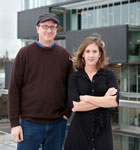
“With the reality of getting through this recession, we look at things very skeptically now.” – Carrie Strickland (right), Principal
To describe Works Partnership Architecture (W.PA) as an up-and-coming, Portland-based sustainable design firm is to be a bit redundant—as principals Carrie Strickland and Bill Neburka readily note, very little gets built in Oregon without LEED or some other form of green certification. But W.PA’s public-transit minded creations and minimalist approach—“requiring project elements to do double or even triple duty,” Strickland says—help the relatively young firm stay afloat, even when economic challenges threaten to pull it under. Here, Strickland and Neburka share their story, philosophy, and challenges en route to success.
How did you two decide to form a business partnership?
Strickland: A developer I’d worked with for a few years had a piece of property under contract to purchase, and we’d just started talking about me starting my own office. I [knew it was] time but also that I didn’t want to do it by myself. And he said, “I know another architect—he lives across the street from me.” That was Bill [Neburka]. I called him up and we met for drinks. It was very much like a blind date: ‘So what do you like to do?’ ‘What are your hopes and dreams?’ And our goals were closely aligned. Our skills match up well; his strengths and mine really work together… it’s rare that that happens.
Can you tell me more about that first meeting?
Neburka: It really was like a first date. You’re looking for somebody to nod at the right points and not furrow their brow. You’re walking through your mental checklist about how you see your future unfolding and hoping that other person is feeling the same way.
Strickland: I’d always had this belief that you didn’t need big budgets to do great design work. And he seemed to be talking about that too. Plus we both had families, and I’d seen his design work through my ex-husband when they were working together and really liked it. He had a clarity to everything he was doing, so I was pretty excited about that.
What sort of philosophies have the two of you brought to the firm?
Neburka: We would always joke about Ivy League firms and how they’d spend three months coming up with their manifesto of how they were going to practice, and meanwhile they’d go out of business because they weren’t actually doing any work. I think we just knew that we wanted to be a design office and to produce a high level of thoughtful work.
Strickland: We’ve also talked about the fact that Bill and I were both from the Midwest and were wondering how much we had of that ‘farmer mentality’—having to be pretty practical about what you take on and making sure every piece of work is representing you in the way that you want. There’s something very reasonable about the approach.
I understand your mission with new projects is to understand the clients’ needs before thinking of creative solutions. Can you explain?
Neburka: While looking at any project … we understand that every component of that costs money and is expected to return money. We have our ideas about what makes a building successful, and how cultures can become an asset of a building, but we’d never say, ‘This is exactly the way something should look.’ It’s really about, ‘Where do you see those areas in your expectation of the project?’ We look to how we’d like it to go and then … if it starts to go sideways, we’ll get on the outside of it and work at it from a different angle.
Many in this industry talk about struggling since the economic freefall of late 2008. How are things looking for W.PA in that regard?
Strickland: What’s interesting to me is that of all the work that may come in, 80 percent of it is what we had in the office three years ago, before the market went down. And most of those projects have kind of changed forms and evolved—just a different way of looking at them. And then to see them start to come back when it started to get better, it felt like ‘Yeah, there’s definitely a turn.’ But with the reality of getting through this recession, we look at things very skeptically now.
Neburka: I think nearly going out of business every three months is pretty sobering. So I would say that right now we are very, very cautiously optimistic.


